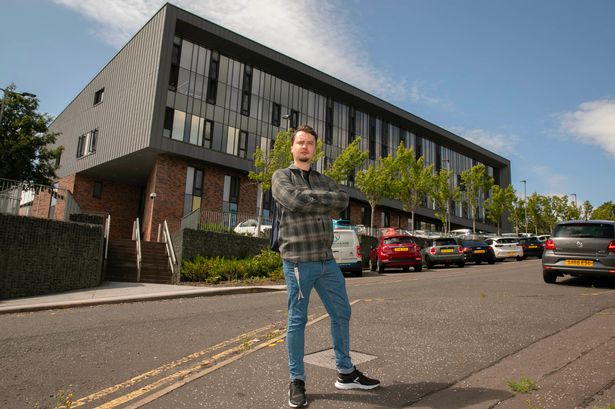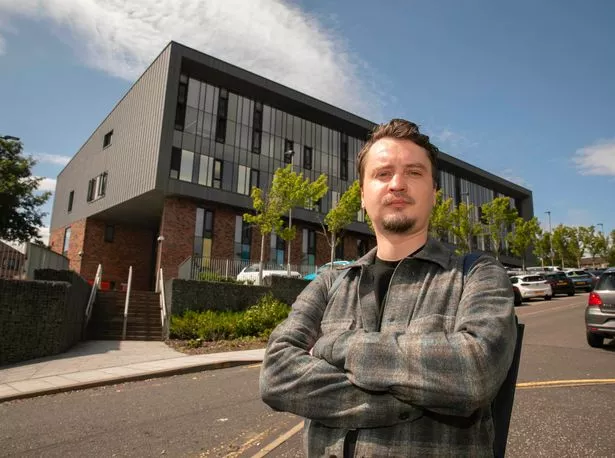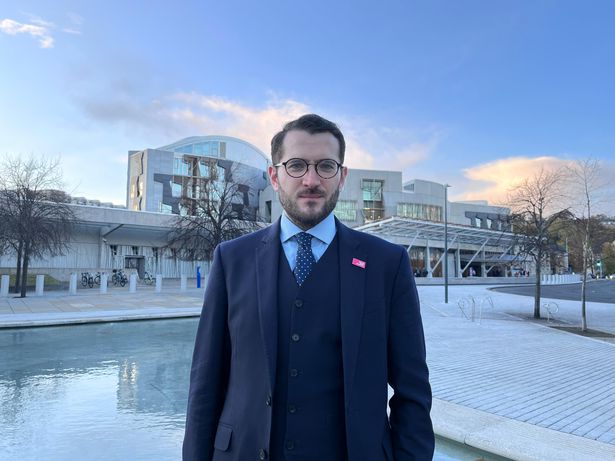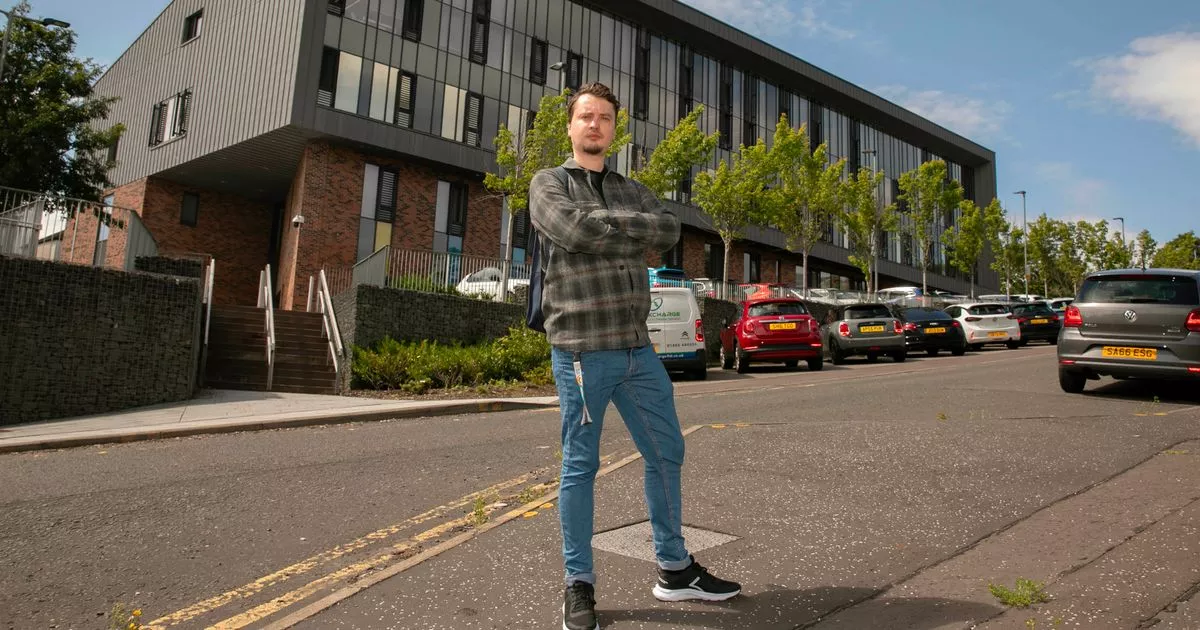Almost 2,500 died as a result of battles categorised under ‘mental health’ or ‘self harm’ over the last five years, while more than 1,300 lost their lives to alcohol and drugs across Glasgow. Service user Marius Samavicius launched an investigation into Glasgow’s mental health care (Image: Alasdair MacLeod/Daily Record)
Service user Marius Samavicius launched an investigation into Glasgow’s mental health care (Image: Alasdair MacLeod/Daily Record)
Thousands of vulnerable Scots died within a year of being discharged from mental health care in Scotland’s biggest city, harrowing figures have revealed.
Almost 2,500 discharged patients have died as a result of mental health struggles or self harm in Glasgow since 2020 – while more than 1,300 lost their lives to alcohol and drug abuse.
A campaigner who uncovered the “heartbreaking” figures claims a lack of follow-up care may be contributing to “thousands of preventable deaths”.
Marius Samavicius, 33, said: “By relying on this narrow definition, the health board can dismiss two-thirds of these tragedies without ever asking if its own discharge process played a role.
“The NHS data writes off over 13,000 of these post-discharge deaths as ‘natural causes’ – a term that brings to mind unavoidable illnesses like cancer or old age. But this classification could hide a more disturbing possibility.
 Marius demanded answers of the NHS(Image: Alasdair MacLeod/Daily Record)
Marius demanded answers of the NHS(Image: Alasdair MacLeod/Daily Record)
“How many of those who died from a ‘natural’ heart attack were too depressed to seek help for chest pain? How many who succumbed to pneumonia were living in unsafe housing because their psychosis went untreated?
“How many died from complications of diabetes because their crippling anxiety prevented them from managing their condition? How many died from being rejected or missed a letter?
“The death certificate records the biological failure of the body. It is silent on the systemic failure that may have caused it. By relying on this narrow definition, the health board can dismiss two-thirds of these tragedies without ever asking if its own discharge process played a role.”
Marius launched an investigation around the city’s care services after a personal three-year battle for support.
The artist uncovered data on the deaths of 20,965 Scots discharged from mental health services between 2020 and 2024.
While natural causes account for the majority of deaths (13,538), mental health causes accounted for 2,283 deaths.
This category covers deaths officially attributed to mental or behavioural disorders, such as PTSD, dementia, schizophrenia, or substance misuse disorders.
Intentional self harm was responsible for 169 deaths, while 767 were alcohol-related and a further 541 linked to drugs.
External causes, such as accidents, violence or other injuries, accounted for 647 of the deaths.
 Freedom of Information data laid bare thousands of deaths (Image: Shared Content Unit)
Freedom of Information data laid bare thousands of deaths (Image: Shared Content Unit)
Unspecified or unknown causes was the category given for 3,020 deaths.
The Freedom of Information data, which covers both inpatient wards and community services, also revealed that one in five quit therapy before it even began.
The monthly average is over 200 people dropping out before their first session.
Marius said: “The failure to hold onto patients begins even before discharge.
“These are people who have asked for help, been assessed as needing it, and then are lost by the system.
“The FOI response states there is no specific policy for monitoring welfare after discharge from services.”
While NHS Greater Glasgow and Clyde provided a category breakdown of how almost 21,000 patients died, they said finding out whether discharged patients were vulnerable, high-risk, or refused care would be too costly.
Marius added: “The absence of this data means the NHS is operating in the dark. It cannot know if its policies are working or if they are funnelling the most vulnerable people out of the system and toward premature death.
“The real cost they are avoiding is the political and financial cost of admitting that their discharge processes and lack of follow-up care may be contributing to hundreds, if not thousands, of preventable deaths.”
 Join the Daily Record WhatsApp community!
Join the Daily Record WhatsApp community!
Get the latest news sent straight to your messages by joining our WhatsApp community today.
You’ll receive daily updates on breaking news as well as the top headlines across Scotland.
No one will be able to see who is signed up and no one can send messages except the Daily Record team.
All you have to do is click here if you’re on mobile, select ‘Join Community’ and you’re in!
If you’re on a desktop, simply scan the QR code above with your phone and click ‘Join Community’.
We also treat our community members to special offers, promotions, and adverts from us and our partners. If you don’t like our community, you can check out any time you like.
To leave our community click on the name at the top of your screen and choose ‘exit group’.
If you’re curious, you can read our Privacy Notice.
Scottish Labour mental health spokesperson Paul Sweeney MSP said: “These figures are simply heartbreaking. Those who need mental health care should be able to access it in a timely manner.
“However, mental health services across Scotland are being pushed to breaking point, with more than one in 12 people on the list waiting more than a year to get help.
“It is vital that SNP ministers address this, but they must also examine the reasons why so many lives are being lost after mental health patients are being discharged.
“It is clear that far too many lives are still being lost to drugs and alcohol in Scotland, and we know that it is not just a case of spending more money but spending it more effectively to tackle this issue.
 Paul Sweeney MSP campaigns for better mental health care
Paul Sweeney MSP campaigns for better mental health care
“When so many people are dying, there can be absolutely no room for complacency from the SNP government.”
NHSGGC sent its condolences to family members who have lost a loved one due to mental health challenges.
A spokeswoman said: “We encourage anyone who is struggling to reach out to friends, family members, or professionals for support.
“We are deeply grateful to the dedicated staff across NHS Greater Glasgow and Clyde who continue to work tirelessly to meet the growing demand for psychological therapies and to ensure those who need the support receive this.
“NHS Greater Glasgow and Clyde’s mental health services operate in line with national policy. All patients referred to our services are assessed, and where appropriate, may be supported through alternative pathways to ensure the most suitable care. Decisions around discharge are also guided by national policy and are based on a range of clinical factors, including the individual’s presentation, engagement with treatment, and completion of appropriate therapeutic interventions.”
A Scottish Government spokeswoman added: ”Every death is a tragedy, and our heartfelt sympathies go out to all those affected.
“Causes of death following discharge are complex and varied and we are committed to improving follow-up care and reducing preventable harm. We expect anyone who accesses NHS or community services to receive timely access to high quality and safe care, as close to home as possible.
“Our Core Mental Health Standards set clear expectations for safe discharge and transitions, including safe handovers and support to re-engage with services if needed.”

